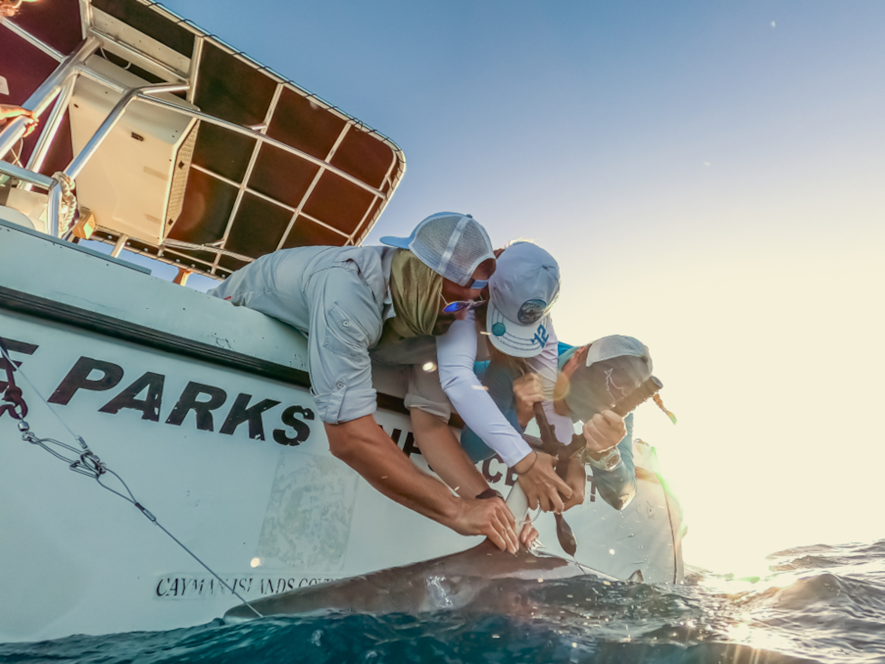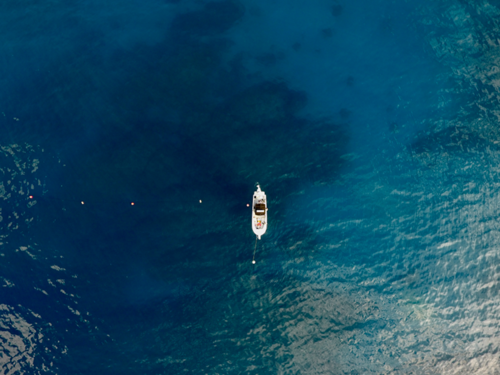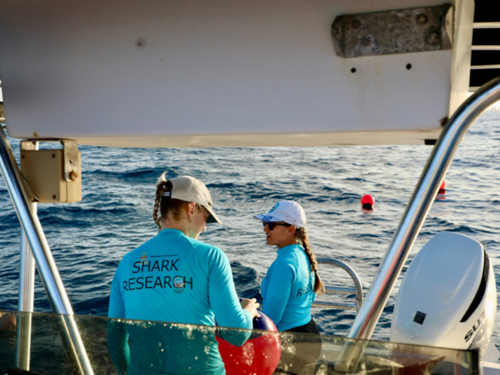Community action for shark conservation

Attaching tag to shark. Credit - James Dartnell.
Uncovering the deep-dive behaviour of Caribbean reef sharks
The Cayman Islands are a British Overseas Territory that encompasses three islands: Grand Cayman, Little Cayman and Cayman Brac. The islands are projections of the Cayman Ridge extending approximately 1,500 km from the Cuban Sierra Maestra Mountain Range in the east to the Misteriosa Bank and Rosario Bank in the west. The Cayman Trench, the deepest trench in the Caribbean Sea, extends to the south reaching depths over 5500 m, offering endless potential for deep sea exploration.
In 2015, the Cayman Islands declared the nationwide protection of all shark species. However, Marine Protected Areas (MPAs) only extend to the 45 m depth contour, leaving deeper dwelling species or individuals exposed to fishing activities. Caribbean reef sharks are of ecological and socio-economic significance and one of the most abundant shark species in the Cayman Islands, yet details of their behaviour beyond 30 m of depth remains a mystery.
In 2022, as part of the Cayman Islands' Department of Environment’s deep-sea research to map Cayman’s deep-sea environment*, Caribbean reef sharks were recorded down to a depth of 200 m. Caribbean reef sharks may play a crucial role in connecting Cayman’s deep and shallow water habitat through daily vertical migrations, consisting of deep-to-shallow movements to forage. In addition, the natural diving behaviour is likely influenced by impacts of human activities and climate change. Grand Cayman is heavily populated with frequent boat traffic and water sport activities throughout the year and increased sea surface temperature could cause sharks to seek refuge at depth. However, to date, higher resolution data on the deep diving behaviour, temperature ranges, and changes over the course of the day in vertical habitat use and long-distance horizontal movements by Caribbean reef sharks is lacking. This information is necessary to identify key drivers of shark behaviour and would help to predict how ecosystem interactions and services might change in the face of climate change and an ever-increasing human population.

Caribbean reef sharks were first recorded moving long distances over abyssal depths and across open water during a previous Darwin Plus funded project1. Sharks were recorded moving between the three Cayman Islands with a maximum distance recorded of 148.2 km. This raised concern about the degree to which this species may travel outside of MPA boundaries and national protection, thus becoming vulnerable to fishing activities at depth and to exploitation elsewhere. Caribbean reef sharks are recognised as one of the top predators on coral reefs throughout the wider Caribbean and are pivotal to the health of and subsequent resources provided by, these ecosystems. In Cayman, the Caribbean reef shark population is relatively low, and several dead sharks are reported each year, raising the question of whether local conservation measures are effective. Elsewhere, out of all shark species, reef sharks have shown a great ‘rebound potential’ to recover after population decline.
This project will start to reveal the depths and areas that are important for the survival of Caribbean reef sharks locally and inform policy makers. To uncover the behaviour of Caribbean reef sharks, this project uses pop-off satellite archival tags (MiniPATs, Wildlife Computers) funded by a Dawin Plus Local grant and supported by sale of White Tip Lager from the Cayman Islands Brewery. So far, Shark Research Coordinator Dr Johanna Kohler and her team have deployed MiniPATs on eight Caribbean reef sharks this summer. These tags collect and store depth, temperature, activity and light-level data. On a pre-programmed date, these MiniPATs detach from the shark and float to the surface, transmitting the archived data to Argos satellites. In addition to attaching the MiniPATs, the Shark Research team took measurements and biological data of the study animals. Some of the sharks caught and tagged had hooks in their mouth, evidence from previous encounters with fishers. The hooks were severely rusted and would eventually fall out, however, it felt wonderful to remove these and release the sharks in better condition (plus MiniPAT accessory) than when we initially found them.

This project has created an opportunity to bridge the gap between Cayman’s shark conservation efforts and the local fishing community. Their collaboration has led to trials of new methods to catch reef sharks and a handful of fishermen have assisted in our fieldwork efforts. Their participation benefited the research team through increased fish activity in the water around the boat, the use of deep-water electric reels, and fishers learned how to safely remove hooks and release sharks. Our hope is that this collaboration continues beyond this project to develop a cohesive conservation action plan for the Caribbean reef shark that is beneficial for both the livelihoods of fishers and the effective conservation of local sharks including the reduction of stress on animals during unintentional catch-and-release.
Recently, a small number of tags have released from the animals and the public in Grand Cayman have rallied around to join the “treasure-hunt” in the search for washed up MiniPATs along the coast. Dedicated volunteers have helped search for these tags in the North Sound, South Sound, and East End. The first MiniPAT that was attached to a Caribbean reef shark was found at Barker’s beach in September 2024. The data collected revealed that the shark swam down to depths over 340 m. In October 2024, steely eyed sailors found and returned a tag in the North Sound. Three MiniPATs are still to be found; one has a direct course for Belize after multiple redirections from hurricanes Helene and Milton. Luckily, most of the data has been transmitted via Satellite, so finding it in Belize and returning it to Cayman would be the cherry-on-top!
We are looking forward to seeing the archived data and gaining a better understanding of what Caribbean reef sharks are up to at depths beyond our physical human reach and territorial waters.
Written by Anne Veeder and Dr Johanna Kohler. For more information on this Darwin Plus Local project DPL00074, led by the Cayman Islands Department of Environment, please click here.
*Collaborative work with Marine Conservation International, Beneath the Waves and Heriot-Watt University, funded by a Darwin Plus Main grant from the Biodiversity Challenge Fund, UK Government.
1 Kohler J, Gore M, Ormond R, Johnson B, Austin T (2023) Individual residency behaviours and seasonal long-distance movements in acoustically tagged Caribbean reef sharks in the Cayman Islands. PLoS ONE 18(11): e0293884. https://doi.org/10.1371/journal.pone.0293884

 Back
Back